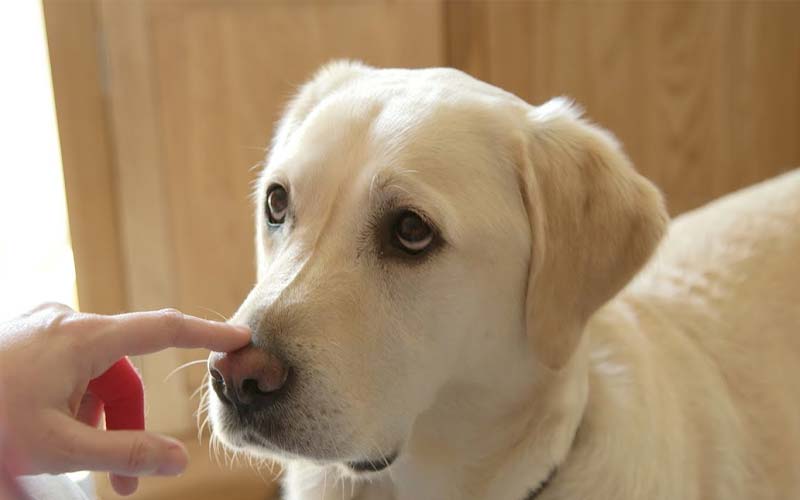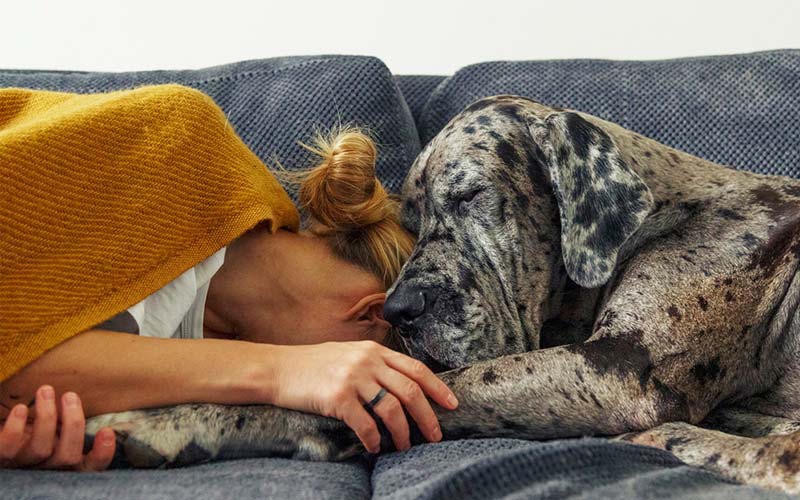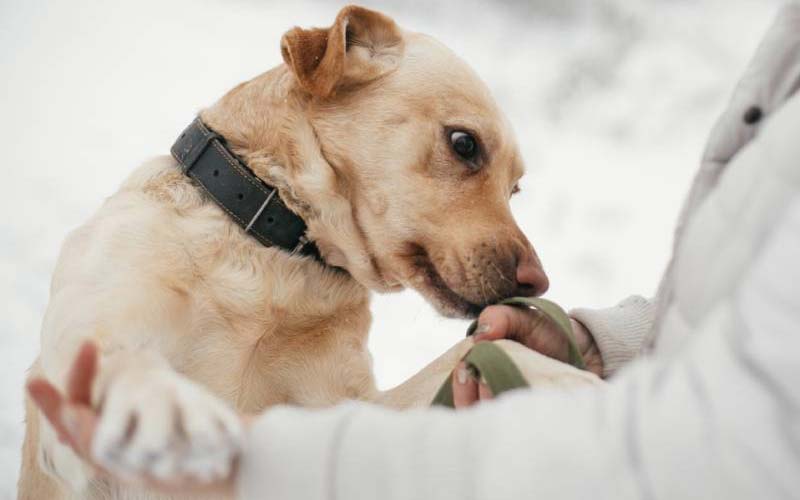Imagine coming home after a long day, feeling under the weather, only to find your dog, Max, lying by your side, his head resting gently on your lap. As you sigh in relief, Max’s comforting presence seems to lift your spirits, offering an unspoken assurance that everything will be okay. This scene is not just a heartwarming anecdote but a testament to the deep, intuitive bond between dogs and their human companions.

Dogs have an extraordinary ability to sense when their owners are unwell, a gift rooted in their heightened senses and profound emotional connection with humans. Their acute sense of smell allows them to detect subtle changes in body chemistry, while their keen observation of our behavior and emotions makes them highly responsive to our needs.
Understanding this remarkable ability not only enhances the bond between you and your pet but also offers practical benefits. By recognizing and interpreting your dog’s responses to your health, you can gain valuable insights that may prompt earlier medical attention and reinforce the supportive role your dog plays in your life. Embracing this connection helps deepen your relationship, making your dog’s presence even more meaningful and beneficial.
1. The Science Behind How Dogs Sense Illness
A. Superior Sense of Smell
One of the most remarkable abilities that sets dogs apart from humans is their extraordinary sense of smell. Dogs possess up to 300 million scent receptors in their noses, compared to the 5 million humans have. This makes their sense of smell nearly 40 times stronger than ours, allowing them to detect minute changes in body chemistry that occur when someone is ill.
When a person is suffering from certain illnesses, such as cancer, infections, or hormonal imbalances, their body releases distinct chemical compounds that dogs can pick up. For example, studies have shown that dogs can detect early-stage cancer in humans simply by sniffing their breath or skin. In some cases, dogs have persistently nudged, licked, or pawed at a spot on their owner’s body, only for it to later be diagnosed as cancerous.
B. Behavioral Awareness
Beyond their olfactory abilities, dogs are highly intuitive when it comes to detecting changes in their owner’s behavior. Dogs spend a lot of time observing their humans, so they can notice subtle shifts in routine, movement, or emotional states. When an owner is sick, they may move more slowly, spend extra time resting, or show signs of discomfort.
Dogs often react to these changes by becoming more attentive, staying closer to their owner, or even acting protectively. A dog that senses illness might follow their owner from room to room, lie near them more frequently, or watch them with concern. These behavioral cues are part of a dog’s natural instinct to monitor and care for its pack, and this includes its human family.
C. Medical Detection Dogs
While all dogs have an innate ability to sense illness, some dogs are trained specifically for this purpose. Medical detection dogs are trained to recognize the unique scents associated with illnesses like diabetes or epilepsy. For example, diabetic alert dogs are trained to smell changes in blood sugar levels and warn their owners before a dangerous hypoglycemic event occurs. Similarly, seizure alert dogs are trained to detect subtle signs before a seizure strikes, giving the person time to prepare or get to a safe place.
Numerous stories highlight how medical detection dogs have saved lives by detecting illnesses early or alerting owners to potential dangers. These highly trained animals serve as both companions and life-saving assistants.

2. How Dogs Respond When Their Owner is Sick
A. Common Behavioral Signs
When a dog senses that something is off with their owner, they often display noticeable changes in their behavior. One of the most common signs is clinginess. Dogs, who are naturally attentive to their human companions, tend to stay close when they sense illness. You may find your dog following you from room to room, lying by your side more frequently, or positioning themselves nearby while you rest. This behavior often stems from a protective instinct—dogs want to be close to their pack members, especially when they detect vulnerability.
Another sign is increased affection. Dogs might become unusually gentle, offering comforting gestures like resting their head on you, licking your hands, or nuzzling into you. This can be a way for dogs to soothe their owner, offering warmth and reassurance through physical contact. Some dogs even become more protective, staying vigilant and watching over their owner while they’re sick.
Dogs may also show signs of alertness when they pick up on unusual symptoms. This could manifest as barking, whining, or pacing if they notice something abnormal in their environment or behavior. A dog that becomes more vocal or agitated might be reacting to physical cues like changes in your movement, breathing, or posture that signal something isn’t right.
B. Emotional Sensitivity
Dogs are highly sensitive to their owner’s emotional state, and illnesses often come with added stress and anxiety. Because dogs have the ability to detect shifts in hormones such as cortisol, which is released when a person feels stressed or anxious, they can sense the emotional component that often accompanies being sick.
Dogs might respond to this emotional distress by offering comforting physical closeness. For example, a dog might press against their owner’s body, nudge their hands or face, or lie directly on them as a way of showing support. Licking, in particular, is often seen as a calming gesture from a dog. Some dogs will repeatedly lick their owner’s hands or face when they sense discomfort, attempting to soothe them in the way they would comfort a fellow dog in their pack.
C. Case Studies or Anecdotes
Numerous real-life stories highlight how dogs have alerted their owners to health problems, sometimes even before the owners were aware of their symptoms. For instance, there have been accounts of dogs detecting cancer by repeatedly sniffing or pawing at a specific part of their owner’s body, leading the person to seek medical attention and discover a tumor.
Another well-known example is of dogs alerting their owners to impending seizures or significant drops in blood sugar, even if they haven’t been trained to do so. These untrained dogs have naturally detected subtle changes in their owner’s behavior, scent, or physical state and acted accordingly, demonstrating just how in tune dogs are with their human companions.
These stories not only reinforce the idea that dogs are highly intuitive animals but also highlight the deep bond between dogs and their owners—one built on trust, loyalty, and emotional connection. Even without formal training, dogs are capable of detecting when their human is unwell, offering both physical and emotional support when it’s most needed.

3. What to Do When Your Dog Detects Something Wrong
A. Trusting Your Dog’s Instincts
When your dog starts behaving unusually—whether by staying closer than normal, becoming more protective, or showing concern through excessive licking or nudging—it might be signaling that something is wrong. Trusting your dog’s instincts can be crucial. If these behavioral changes are persistent, take note of any other signs they may be reacting to, such as changes in your own physical health or emotional well-being.
It’s essential to pay attention if your dog continues these behaviors over several days. If your dog is fixated on a certain area of your body or appears overly concerned about your condition, it could be an early indication of something requiring medical attention. Don’t hesitate to seek professional help if your dog’s behavior suggests they’re sensing something unusual.
B. Consulting Veterinarians and Doctors
Before assuming your dog’s behavior is a reflection of your health, it’s important to first rule out any issues with your dog’s well-being. A change in your dog’s behavior could also be a sign that they’re experiencing their own health problem, such as pain, anxiety, or discomfort. A visit to the veterinarian should be the first step to ensure your dog is in good health.
Once your dog’s health is cleared, it’s wise to take your own health into consideration. If your dog’s behavior continues to be unusual, especially after medical concerns for them have been ruled out, consult with your doctor. Dogs can sometimes alert their owners to potential health problems before symptoms become obvious, so it’s worth discussing any concerns with a healthcare provider.
C. Preventive Care and Strengthening Your Relationship
Maintaining regular health checkups for both you and your dog is essential for long-term wellness. Preventive care helps catch any health issues early on and ensures that both you and your dog are in good physical condition.
To enhance your dog’s awareness and bond with you, engage in bonding activities like training sessions, interactive games, and physical exercise. These activities not only keep your dog mentally and physically fit but also help reinforce their sensitivity to your emotional and physical cues. The stronger the bond, the more attuned your dog will be to detecting when something is amiss.

Conclusion
In summary, dogs possess a remarkable ability to sense when their human companions are unwell, thanks to their superior sense of smell, keen behavioral awareness, and emotional sensitivity. This ability not only underscores the profound bond between dogs and their owners but also highlights the practical benefits of understanding how dogs respond to illness. Recognizing and appreciating your dog’s instinctive responses can enhance your relationship and even prompt early medical interventions, potentially leading to life-saving outcomes.
Trust in the deep, intuitive connection you share with your dog. Their capacity to offer comfort and, in some cases, act as early warning systems for health issues is a testament to their loyalty and sensitivity. By paying close attention to your dog’s signals, nurturing this relationship through positive interactions, and prioritizing both your health and your dog’s well-being, you strengthen this invaluable bond.
Embrace the unique role your dog plays in your life and ensure both of you receive the care and attention needed to stay healthy and happy together.